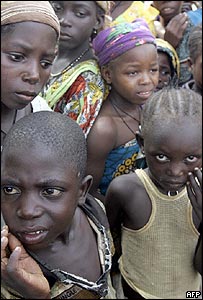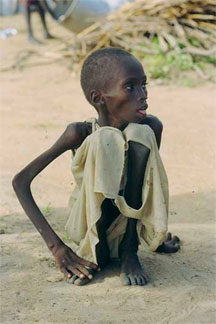The two faces of
Niger
Jeevan Vasagar in Tahoua, Niger
Monday August 1, 2005
The Guardian
 In
Tahoua market, there is no sign that times are hard. Instead, there are
piles of red onions, bundles of glistening spinach, and pumpkins sliced
into orange shards. There are plastic bags of rice, pasta and manioc
flour, and the sound of butchers' knives whistling as they are sharpened
before hacking apart joints of goat and beef.
In
Tahoua market, there is no sign that times are hard. Instead, there are
piles of red onions, bundles of glistening spinach, and pumpkins sliced
into orange shards. There are plastic bags of rice, pasta and manioc
flour, and the sound of butchers' knives whistling as they are sharpened
before hacking apart joints of goat and beef.
A few minutes' drive from the market, along muddy streets filled with puddles of rainwater, there is the more familiar face of Niger. Under canvas tents, aid workers coax babies with spidery limbs to take sips of milk, or the smallest dabs of high-protein paste.
Wasted infants are wrapped in gold foil to keep them warm. There is the sound of children wailing, or coughing in machine-gun bursts.
"I cannot afford to buy millet in the market, so I have no food, and there is no milk to give my baby," says Fatou, a mother cradling her son Alhassan. Though he is 12 months old he weighs just 3.3kg (around 7lbs).
Fatou, a slender, childlike young woman in a blue shawl, ate weeds to survive before her baby was admitted to a treatment centre run by the medical charity MSF.
This is the strange reality of Niger's hunger crisis. There is plenty of food, but children are dying because their parents cannot afford to buy it.
The starvation in Niger is not the inevitable consequence of poverty, or simply the fault of locusts or drought. It is also the result of a belief that the free market can solve the problems of one of the world's poorest countries.
The price of grain has skyrocketed; a 100kg bag of millet, the staple grain, costs around 8,000 to 12,000 West African francs (around £13) last year but now costs more than 22,000 francs (£25). According to Washington-based analysts the Famine Early Warning System Network (Fewsnet), drought and pests have only had a "modest impact" on grain production in Niger.
The last harvest was only 11% below the five-yearly average. Prices have been rising also because traders in Niger have been exporting grain to wealthier neighbouring countries, including Nigeria and Ghana.
Niger, the second-poorest country in the world, relies heavily on donors such as the EU and France, which favour free-market solutions to African poverty. So the Niger government declined to hand out free food to the starving. Instead, it offered millet at subsidised prices. But the poorest could still not afford to buy.
At Tahoua market the traders are reluctant to talk about the hunger crisis affecting their countrymen as they spread their wares under thatched verandas jutting out from mud buildings. Snatches of the Qur'an from tinny tape players compete with Bollywood songs and the growl of lorries bringing sacks of rice and flour.
One man opens his left palm to display half a dozen tiny scorpions, a living advert for the herbal scorpion antidote he is selling in his other hand.
Omar Mahmoud, 18, who helps sell rice at his father's shop, blames the famine on drought: "I know there is hunger. It is because there wasn't enough rain. The price of millet has gone up because there wasn't enough rain last year."
 Last
month around 2,000 protesters marched through the streets of the capital,
Niamey, demanding free food. The government refused. The same month, G8
finance ministers agreed to write off the country's $2bn (£1.3bn) debt.
Last
month around 2,000 protesters marched through the streets of the capital,
Niamey, demanding free food. The government refused. The same month, G8
finance ministers agreed to write off the country's $2bn (£1.3bn) debt.
"The appropriate response would have been to do free food distributions in the worst-affected areas," said Johanne Sekkenes, head of MSF's mission in Niger.
"We are not speaking about free distribution to everybody, but to the most affected areas and the most vulnerable people."
The UN, whose World Food Programme distributes emergency supplies in other hunger-stricken parts of Africa, also declined to distribute free food. The reason given was that interfering with the free market could disrupt Niger's development out of poverty.
"I think an emergency response should have started much earlier," says Ms Sekkenes. "Now we find ourselves in this serious nutritional crisis, with children under five who are suffering."
Three weeks ago the Niger government, its foreign donor countries and the UN did a volte-face, jointly agreeing to allow the distribution of free food. Aid is now being flown in from Europe and trucked from neighbouring countries.
A total of 3.6 million people live in the regions of Niger affected by the food crisis. According to the most reliable estimate, some 874,000 people now need free food to survive.
The food aid will arrive as children weakened by hunger face a new battle against disease. It is the rainy season in Niger, and the water helps spread diseases such as malaria and diarrhoea.
In the MSF treatment centre, a three-year-old girl called Aminata is suffering from a grotesque eye condition. Her eyeball is so swollen with fluid that it has popped out of her skull and bulges from her face. The doctors call it a retinal blastoma, the result of an untreated eye infection.
"The thing in her eye started off very small," said Aminata's mother, Nisbou. "I did not have money for hospital, so I treated it with herbs, traditional medicine."
The hunger crisis has struck communities which depend on a mix of subsistence farming and herding for their livelihoods. The stories told by the women in the treatment centre show that their plight began when locusts ate their crop and cattle fodder, but spiralled when the prices of food in the market shot out of reach.
In desperate times, adults can get by on the poorest of foods, weeds and the stubble of their crops, but mothers cannot make breastmilk on this diet and infants cannot eat weeds.
Amid the anxiety, there are unexpected moments of gaiety in the feeding centre. Asked her age, Nisbou, who is probably about 20, replied: "I am 100 years old." She burst out laughing at her own joke, then looked weary again, and tucked her baby's deformed face under a lace shawl.
The Reason Why You Shouldn't Give Money to Big Charities
 I am disgusted with America's charities, who pay their executives 6-digit
salaries.
Children International asks for donations of $22 per child to provide
food, medical, education and other needs. Yet, their CEO was paid
$347,381 in 2007! It is appalling to me that an organization that
stresses how far a mere $22 will go per month, pays their CEO $347,381
a year! That's just plain wrong in my opinion. Anything can be
justified, but that doesn't necessarily make it proper or ethical.
I am disgusted with America's charities, who pay their executives 6-digit
salaries.
Children International asks for donations of $22 per child to provide
food, medical, education and other needs. Yet, their CEO was paid
$347,381 in 2007! It is appalling to me that an organization that
stresses how far a mere $22 will go per month, pays their CEO $347,381
a year! That's just plain wrong in my opinion. Anything can be
justified, but that doesn't necessarily make it proper or ethical.
The Salvation Army isn't quite as bad, they only paid their CEO $175,050 in 2004. No doubt, they have all kinds of excuses to justify such outrageous salaries; but no one needs that kind of salary, and it is certainly unbecoming of a so-called “charitable organization.” I realize that top executives are often paid high salaries for their fund-raising abilities and expertise; yet, it's just inconsistent with all the plethora of ads we see begging for our donations, which might mean “life or death to some child.” If that's the case, just think how many more children's lives could be saved if the CEO's of these fat cat charities were to give back 80% of their salary, God forbid, and actually have to live on $75,000 a year! My, oh my, how would they survive?
What gets me is that a charitable organization can actually pay their CEO $375,000 a year and still be rated by the BBB as a great company. Not in my book! The BBB is a joke in America! Many companies who support the BBB are given preferential treatment. In my opinion, you can't trust information from the BBB, nor from America's big charities.
Red Cross and United Way are even worse. The top CEO at Red Cross pulled down a $651,957 salary in 2003! According to Forbes, United Way's top executive made $629,950 in 2004! Why do people support these fat cat charities?
A lot of people give money to charities to boost their public image, feel good about themselves or to find a tax write-off. It is a sore evil in America. While an estimated 18,000 children continue to starve to death daily throughout the world, and others eat bugs to survive, America's biggest charities continue to pay their top executives outrageous salaries. It is a false balance in God's eyes. Few people realize these days that America's charities have become lucrative businesses.
My advice to people is to find some poor person and give the money directly to them. There are many poor people today, and others who have lost their jobs, or are homeless, and you can be a blessing to them directly. And best of all, you know that 100% of the money is going to charity, and not helping to pay someone's $600,000 salary! Really, it is insane to pay someone that kind of money in a so-called “charity.”
Who do you think will appreciate your money more... some fat cat charity or a struggling family who has no income?
If you DO decide to support any charity, demand a financial report of where the donations are being spent. This way you can see first hand where your money is going, and can make sure that you're not buying someone a mansion in the suburbs. Don't accept a vague summary, kindly ask for specifics. If they don't disclose such information, give elsewhere. Honestly, too many people are abusing the system today, living extravagantly on donations, because people don't think.
I just can't in good conscience drop my money into a Santa Claus's bucket at Christmas time, when I know the top dog at the Salvation Army is getting paid $175,000 a year!
I cringe when I hear ads telling people how much their $22 a month can do to better a poor child's life, knowing that the CEO of that charity got paid $347,381 in 2007! Yet, so many people sit at home, staring at some picture of a child they're supporting for $22 a month, failing to realize that the CEO of that company makes 15-TIMES what the average American family gets paid annually. No CEO of a charitable organization ought to be paid more than $47,381 a year, which leaves $300,000 remaining from this guy's salary. For $22 per month, $300,000 can help an additional 1,136 poor children! Yet, the charity appeals to the American public, from families who are struggling financially to live on $30,000 a year, to give $22 per month. The whole charity scene in America is enough to make one want to go vomit.
Please stop giving to big charities and start giving money directly to the poor.
Furthermore, most of those big charities don't share the Gospel with the people being helped. Even the Salvation Army is more Army than Salvation these days. When you give money directly to the poor, you can witness to them concerning Jesus Christ, or give them a Gospel of John. Just think how much further your money can go by giving it directly to the poor. I am a firm believer in helping the poor, but not through some fat cat organization that keeps back $600,000 a year for it's CEO. That's crazy!
